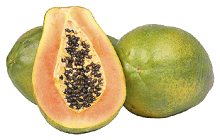Papaya: The Delicious Powerhouse Fruit that Can Help Prevent Heart Disease, Cancer
by www.SixWise.com
Papaya is a sweet, tropical fruit that originated in Central
America. Today, though, its popularity has made it easily
accessible throughout the United States (which, along with
Mexico and Puerto Rico, is now one of the biggest commercial
producers of the fruit).
|

Papaya is delicious eaten as is, or you can enhance
its flavor by adding a squeeze of fresh lemon or lime
juice.
|
Aside from bringing a delectable taste of the tropics to
your table, papayas are one of the healthiest fruits out there.
They're rich in vitamin C (one serving will give you close
to a three-day supply!), folate, potassium, fiber, and vitamins
A, E and K, along with antioxidant
flavonoids.
Papaya's peak season is early summer and fall, so right now
is an ideal time to enjoy this nourishing fruit.
Top Health Benefits of Papaya
Why eat papaya? It's delicious, refreshing and will support
your health in the following ways.
1. Promote Good Digestion
Perhaps the most well-known benefit of papaya is its digestive
support. Papaya, particularly the skin and the unripe, green
varieties, contains the enzyme papain, which helps digest
proteins. (Papain is often used to make digestive enzyme dietary
supplements as well.)
Papaya also contains nutrients, such as fiber and folate,
which are known to help prevent colon cancer. Its fiber, for
instance, helps bind with and rid your body of cancer-causing
toxins in your colon.
2. Fight Heart Disease
The nutrients in papaya help prevent the oxidation
of cholesterol in your body. This is important because when
cholesterol becomes oxidized it can stick to your blood vessel
walls, leading to plaque that can cause heart attacks and
strokes.
3. Anti-Inflammatory Properties
The enzymes in papaya are known to lower inflammation
in your body. This is effect is particularly beneficial for
people with asthma, osteoarthritis,
rheumatoid arthritis or burns.
4. Support Your Immune System
Because papaya is so rich in vitamins A and C, it is an excellent
fruit to eat to keep your immune system functioning properly.
5. Protect Your Eyes and Lungs
Eating fruit like papaya has been found to protect against
macular degeneration, the most common cause of vision loss
among the elderly, along with promoting lung health (particularly
if you're exposed to a lot of secondhand smoke).
6. Fight Prostate Cancer
Papaya is rich in lycopene, which is known to prevent damage
to DNA and fight
prostate cancer. In fact, studies have shown that men
who eat the most lycopene-rich fruits and vegetables (including
tomatoes, apricots, pink grapefruit, watermelon, papaya, and
guava) were 82 percent less likely to have prostate cancer
than those who ate the least.
Papaya is so rich in nutrients that its benefits do not end
there. Other pluses to eating this powerhouse fruit include:
-
It's good for you skin, hair and nails
-
When applied to your skin, it may fade freckles
-
The folate it contains may prevent anemia
-
The skin can be used as an external treatment for wounds
or areas that will not heal quickly
-
You can apply papaya to your skin to relieve the itch
and irritation from mosquito bites
How to Choose, and Eat, Papayas
If you're not yet familiar with this tropical fruit, look
for a papaya that's soft with red-orange skin. You can choose
a fruit with yellow skin, but be aware that it will take a
few days to become fully ripe (to hasten ripening, put the
papaya in a brown paper bag with a banana). For the best flavor,
eat the papaya as soon as it's ripe.
|

The seeds of the papaya ARE edible. They have a pleasant
peppery flavor that's especially good added in to salad
dressings.
|
Both the flesh and the seeds of papaya are edible. The seeds
have a peppery flavor and are excellent sprinkled on salads,
or blended into salad dressings.
The fruit itself can be eaten alone (try it with a squeeze
of lemon or lime juice to enhance its flavor), in fruit or
green salads or even cooked. For something different, try
out these two unique papaya recipes; they're simply delicious!
Roasted Papaya With Brown Sugar
Ingredients:
- 2 tablespoons light-brown sugar
- 1/4 teaspoon ground ginger
- 2 medium Solo papayas (14 ounces each), halved lengthwise
and seeded
- 1/4 teaspoon cayenne pepper
- 1 lime, cut into 4 wedges
Directions:
- Preheat oven to 450 degrees. Stir together sugar and
ginger in a small bowl. Arrange papaya halves, cut sides
up, in a 10-by-13-inch baking dish. Sprinkle sugar mixture
evenly over halves.
- Bake, brushing papaya edges with melted sugar mixture
(it will collect in well of fruit) 2 or 3 times, until mixture
is bubbling and papaya edges are beginning to darken, 35
to 40 minutes.
- Sprinkle each serving with a pinch of cayenne. Serve
with lime wedges.
Spicy Papaya-Carrot Salsa
Ingredients:
- 1 small chayote, peeled, seeded, and cut into 1/4-inch
dice
- 2 medium carrots, peeled and cut into 1/4-inch dice
- 2 1/2 cups papaya (Solo or Mexican) chunks (1/2 inch)
- 1/3 cup distilled white vinegar
- 1 or 2 fresh Scotch bonnet chiles, thinly sliced
- 1 teaspoon light-brown sugar
- 1 teaspoon coarse salt
Directions:
- Bring 3/4 cup water, the chayote, and carrots to a boil
in a medium saucepan. Add papaya, vinegar, chiles, sugar,
and salt. Return to a boil. Reduce heat; simmer, partially
covered, until chayote and carrots are tender, 20 to 25
minutes.
- Remove from heat. Process one-third of mixture in a food
processor; return to saucepan, and stir to combine. Salsa
can be refrigerated up to 2 weeks; serve warm, cold, or
at room temperature.
Recommended Reading
From
Mangoes to Butternut Squash to Carrots: Why You Need More
Orange in Your Diet
10
Delicious, Nutritious Fruits You've Likely Never Heard of
That Are Growing in Popularity
Sources
The
World's Healthiest Foods
MarthaStewart.com